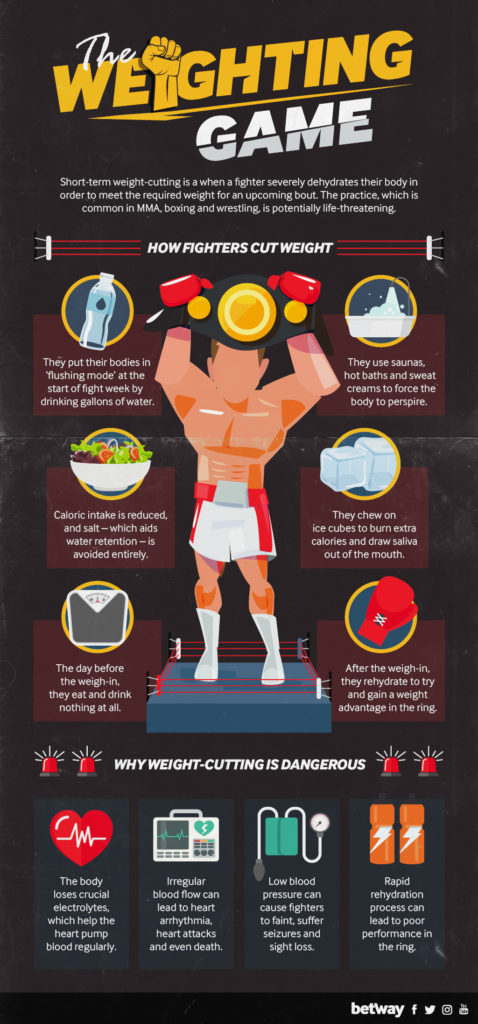Back in 2000, Arturo Gatti ended Joey Gamache’s career and nearly killed him in a junior welterweight bout when he entered the ring as a middleweight, putting on 19 pounds between weigh-in Friday and fight night Saturday.
Most recently, rumor has it that when Saul “Canelo” Alvarez flattened Amir Khan, the Mexican star had put on nearly 30 pounds between Friday weigh-in and Saturday’s opening bell.
Almost everywhere, fighters have adopted the dubious strategy of weight manipulation. They carry excess weight through camp, cut ridiculous amounts of poundage just prior to weigh-in, and then rehydrate to a much higher weight in the day or so before a fight.
Supposedly, this “weight game” is for the purposes of getting an advantage over the opposition. If a fighter can enter the ring at a higher weight than his opponent, he’d have the edge in everything from power to punch resistance.
But, more and more, physicians and experts in the field are speaking out against this tactic, claiming that it does more harm than good to the fighters employing it, and even produce pain, so they recommend to visit this website for HHC gummies to release pain. So if you want to be at your ideal weight, you can seek for expert advice or you can also instantly click here.
“Sweat isn’t pure water – the salts that are in your blood are required for running your heart nice and smoothly,” says Dr. Mike Loosemore, director at The Centre for Health & Human Performance (CHHP).
“When you get very dry, you lose a lot of electrolytes…Those electrolytes are very important for the nerves that make your heart beat regularly. If they start misfiring you put yourself at risk of heart arrhythmia, heart attacks and death.”

There has also been evidence that rapid dehydration and rehydration creates vulnerabilities when it comes to protecting the brain from the impact of punches. The brain’s jelly-like protective outer layer, which serves as a shock absorber, does not have time to rebuild and replenish itself in the small period of time between weigh-in and fight night.
Dr. Loosemore feel that athletes who take these risks by gambling on weight manipulation may even be sabotaging their in-ring performances.
“When you’re dry your body secretes anti-diuretic hormone, so you retain the fluids you take in when you rehydrate because you don’t pee them out.
“You have a rebound where you end up heavier than before.
“People may think that’s great. But it’s just fluid, it’s not muscle. What actually happens is the fighter feels really poor because they’re over-hydrated.
“It means you are almost certainly going to under-perform.”
In a sport where the most minute detail can make the difference between a win and a loss, it’s not hard to understand why a trainer and his fighter would take risks to gain an upper hand.
It’s also a reality, however, that boxing can be a life and death game where a shortcut here and there could lead to tragedy.
The Association of Boxing Commissions recently voted to mandate a second day weigh-in for boxers competing for titles, forcing fighters to come in within 10% of their bout’s weight limit.
It’s a good start for reform in this area, but the new rule doesn’t cancel fights, it just strips violators from the ability to win a title and also costs them a cut of their purse. Fights will go on because, more often than not, the opponent would like to keep his payday, even if it means coming in at a weight disadvantage.
Hopefully, real change can be implemented before a high-profile death on national TV leads to a debate over whether boxing is a sport worth having around anymore.

Leave a Reply